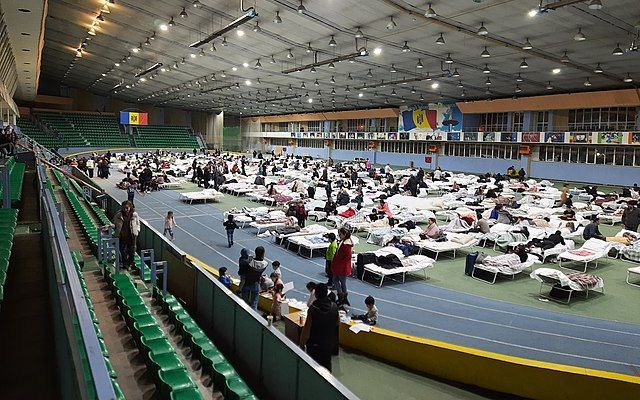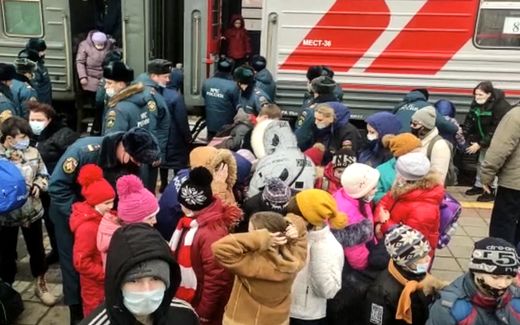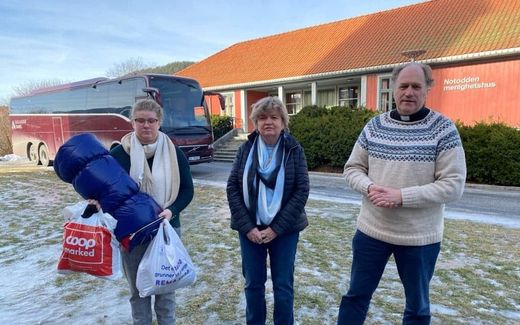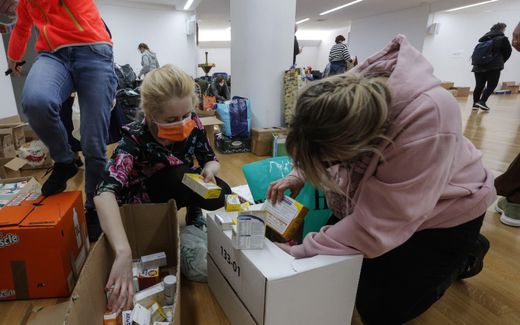Churches in Moldova filled with refugees
06-04-2022
Eastern Europe
Knut Reier Indrebø, KPK

Refugee centre in Moldova. Photo Wikimedia
Eastern Europe
No country has received more Ukrainian refugees in terms of population than the poor country of Moldova. Amid the flow of refugees is the Thunheim family from Norway. They do what they can to help.
Tommy Thunheim: "Every day, buses with refugees run past our house. The streets are full of Ukrainian cars, and many refugees have arrived on foot. Several hundred thousand crossed the border in the first weeks of the conflict. New refugees still arrive every day. In the beginning, most people only possessed what they were wearing. They were completely dependent on help."
According to the United Nations High Commissioner for Refugees, Moldova has received about 260,000 refugees. That number is equivalent to 10 per cent of the country's population and a record in Europe. In addition, many Ukrainians have fled through Moldova on their way to Romania.
Supporting poor Moldovans who want to help neighbours
Thunheim comes from Orre on Jæren, while his wife Tanya comes from Moldova. They met in the Den Evangelisk Lutherske Frikirke at Bryne in Rogaland, Norway and are envoys from there. For the past 12 years, they have lived in the Moldovan capital Chisinau. Their children, Samuel (9) and Evelin (7), speak both Russian and Norwegian.

Since 2012, the family has been running the organisation Encourage Moldova. It mainly works to support Moldovans who want to help others. The couple works as missionaries. Many Norwegians support them.
"Part of what we do now is more direct help. We drive out food and clothes, underwear and socks, of which people only brought one change. Then they need help", Thunheim says to Norwegian news agency Kristelig Pressekontor.
Authorities do not have enough resources to deal with refugees
Many Norwegians only know Moldova from the Eurovision Song Contest. With only about 2.6 million inhabitants and little value except for wine production, the country is quickly forgotten among other European nations. After the fall of the Iron Curtain, the country became independent. Since then, there has been a massive wave of emigration. About 30 per cent of the population has left the country that is considered the poorest in Europe.
"Moldova is an impoverished country. People use all the ways they can to get out of here. They grew up with a mindset that it is "not good enough" here and that the country will always remain poor. Today, about 60 people move out of the country every day", Thunheim says to KPK.
Now, the country has ended up in the middle of chaos. The authorities do not have enough resources to deal with many refugees from Ukraine. Therefore, Ukrainians are entirely dependent on civilians to help them.
Tommy Thunheim: "Not far from us, there is a large conference centre packed with refugees. There are not enough beds. There is not even a sufficient number of seats for everyone."
After a long wait at the border, the Ukrainian refugees have to walk at least 10 kilometers before reaching the nearest town. Frozen mothers with young children walk over the roads without knowing where they are going.
Nevertheless, Thunheim is impressed with how Moldovans line up to help, despite their poverty. "People have jumped in cars and driven to the border to pick up people. On their way back, they ask around to see if anyone has the opportunity to take in the refugees. People who do not have much money pay cash. Due to the high fuel prices, they cannot afford to drive. But now they see that they are not the poorest, since they can still help others in need."
Churches are crowded
Thunheim says there is a constant need for help. "I have gone to the train station several times to see if there were people who needed something. We have had a family in our house for two weeks, Jærbuen says.
In principle, the refugees will receive help and food. However, women with small children who live in apartments and houses in the countryside will not get to the food distribution points. Nevertheless, they need help. Phone companies issue sim cards with free data and calling for refugees, and restaurants allow Ukrainians to eat for free. Churches have set up their own call centres that receive inquiries and pass on the needs.
Thunheim has the impression that especially Christian congregations and individuals have mobilised help initiatives to an extent never seen before. "There is almost no church building that does not receive refugees at the moment. They let people in far beyond their helping capacity in faith and hope all works out. Where differences between different faith communities were previously seen as significant, mobilisation works unifying. Theology is reduced to helping widows and orphans in need", Thunheim quotes James's letter. According to him, it is a miracle of God.
Country is dependent on Russian gas
During the Soviet era, each state had its own role. While Ukraine was the breadbasket, Moldova was the wine bottle. Today, the country prides itself in two tourist attractions: the world's largest wine cellar and the world's second-largest wine cellar.
Thunheim says that the country does not have many resources besides agricultural land. "There is no oil or gas, and the country is dependent on Russian energy sources. But even though people live in poverty, they are delighted and cheerful. They do not save anything when they gather, but they bring a lot of food to the table, sing and dance."
Encourage Moldova, the organisation Thunheim runs, started up after an orphanage needed a minibus to take children on trips. The Thunheim family started gathering money to pay for the bus. "Our strength is that we can help individuals and small organisations with little projects. For authorities and large organisations, it takes a long time to mobilise. Small and voluntary organisations are more flexible. We especially want to help those who help others but do not have many resources to do so. They are the ones who do something anyway and have a heartfelt motivation. That makes it extra meaningful to contribute", he says.
Connected to Russia
As a former Soviet country, Moldova has a strong connection to Russia. During the Soviet era, people spoke Russian. Therefore, for many, Russian is the native language of many Moldovans.
"Almost everyone here, including our family, has family, friends or relatives in Ukraine and Russia. We know people who are now in the middle of the war. It makes the situation complicated and difficult. The war affects people greatly, and we feel it in our bodies. How should one deal with the conflict when one knows people on both sides?" Thunheim asks. In any case, he continues to help those who need it most, with good support from Norway.
Facts about Moldova
-
Moldova is considered Europe's poorest country and is located east of Romania. It borders Ukraine to the east. Therefore, it has received a large influx of refugees from there.
-
Historically, most of present-day Moldova was part of Romania originally. However, it was occupied by the Soviet Union after World War II. With the dissolution of the Union in 1991, the country became independent.
-
Moldova has about 2.6 million inhabitants. That number is declining because of a large stream of emigration.
-
The living standard in Moldova is so low that the country depends on various forms of external assistance. Among those who help is the small organisation Encourage Moldova. It is led by the Norwegian Tommy Thunheim and his Moldovan wife, Tanya.
This article was translated by CNE.news and published earlier by Kristelig Pressekontor on March 31st 2022.
Related Articles





